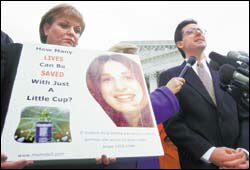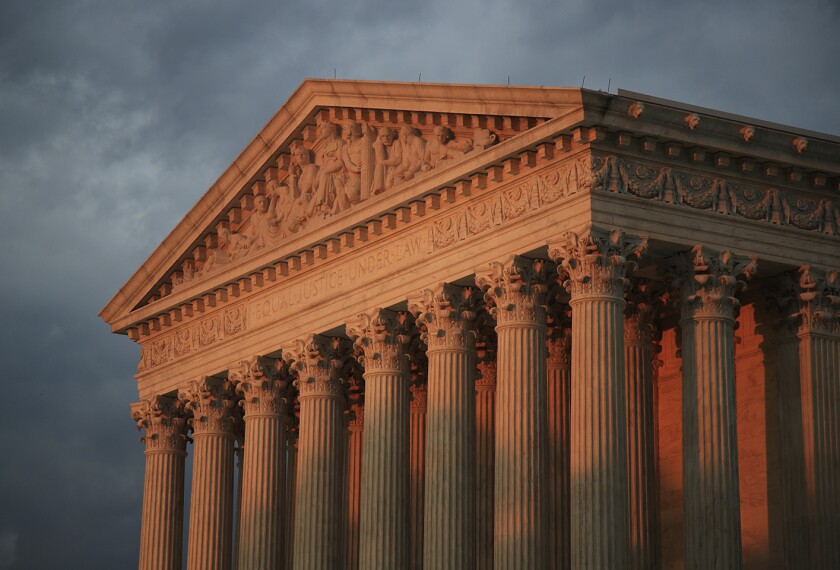Drug testing in schools stoked an intense argument in the U.S. Supreme Court last week, with a seeming majority of the justices willing to expand a 1995 decision that allowed drug testing of student athletes, and thus uphold an Oklahoma district’s policy of testing a wider group of students.

|
Lawyer Graham Boyd, right, representing the American Civil Liberties Union and an Oklahoma family, discusses their challenge of drug tests after Supreme Court arguments March 19. Sharon Smith of Harrisburg, Pa., left, whose daughter died of a drug overdose, sees the tests from a different perspective. |
“Children today are on the front lines of the drug problem,” said Paul D. Clement, a deputy solicitor general who provided the Bush administration’s argument in support of the Tecumseh, Okla., district’s policy of testing participants in such extracurricular activities as choir, band, and the Future Farmers of America.
“The danger is getting young people used to a drug culture,” Justice Antonin Scalia said in agreement during the March 19 oral arguments in Board of Education of Independent School District No. 92 of Pottawatomie County v. Earls (Case No. 01-332). Justice Scalia wrote the majority opinion in the case that upheld testing of athletes, Vernonia School District v. Acton, and he made it clear last week that he believed that expanded testing does not violate the Fourth Amendment’s prohibition against unreasonable searches.
“You have to remember we’re dealing with minors,” Justice Scalia told the lawyer for a family that challenged the drug-testing program in Tecumseh. “Schools stand in loco parentis.”
Justice Anthony M. Kennedy said that a student offended by the drug-testing policy could choose not to participate in extracurricular activities.
“You seem to say there has to be some great crisis where we lose a bunch of kids to drugs” before a testing program might be justified, he told Graham A. Boyd, the American Civil Liberties Union lawyer representing Lindsay and Lacey Earls, the students who challenged the program through their parents.
But some justices were dubious about the Tecumseh program’s constitutionality. Justice David H. Souter suggested to the lawyer for the school district, Linda M. Meoli, that upholding testing of students in extracurricular activities would pave the way for testing “every child in every school in the United States.”
Ms. Meoli said the 2,050-student Tecumseh district was not seeking a ruling that all students could be tested, even though members of the school board pondered that option when the district implemented its testing policy in 1998.
“The line has to be drawn somewhere,” she said. “Tecumseh’s policy represents a natural, logical, and rational response to this court’s ruling in Vernonia.”
But Mr. Clement, asked by Justice John Paul Stevens whether submitting all students in a public school to drug testing would pass muster under the Fourth Amendment, said: “We think that would be constitutional.”
Seeking Guidance
Districts are closely watching the outcome of the Oklahoma case for guidance on drug testing.
The program from an Oregon district at issue in the Vernonia case was limited to student athletes. A 6-3 majority agreed athletes could be subject to testing because they already had a lesser expectation of privacy than other students, they faced greater risk of injury during play if impaired by drugs, and were role models.
Since that ruling seven years ago, drug testing has expanded but has by no means taken off in a majority of the nation’s roughly 15,000 school districts. As districts have moved a step or two beyond testing only athletes to include other categories of students, lower courts have issued conflicting rulings about what is constitutional.
In Oklahoma, the Tecumseh school board adopted its policy in 1998, subjecting all students in competitive extracurricular activities to urinalysis drug testing at the beginning of the year and random tests throughout their seasons. Under the policy, students whose tests show evidence of illegal drug use face a loss of eligibility for their activities but no other penalties. (“Testing the Limits Of School Drug Tests,” March 13, 2002.)
“They said, ‘We kind of feel bad about stigmatizing our athletes. Who else can we test?’ ” the ACLU’s Mr. Boyd told the justices, referring to the Tecumseh school board. “That is not identifying a drug problem.”
A federal district court upheld the policy. But the U.S. Court of Appeals for the 10th Circuit, in Denver, ruled 2-1 last year that testing students beyond athletes could not be justified without evidence of a serious drug problem among the students targeted.
When Ms. Meoli, the district’s lawyer, began defending the testing program before the Supreme Court last week, it soon became clear that the hourlong session would stir passions.
Justice Souter was so eager to counter pro-drug-testing questions that he drew a rebuke from Chief Justice William H. Rehnquist at one point for not letting Ms. Meoli finish an answer.
“Don’t you want to deter drug use among those who don’t go out for the band?” Justice Souter asked Ms. Meoli. “It seems that if we take your argument, there is at least an equal argument for testing everybody in the school.”
Justice Sandra Day O’Connor, who wrote a vigorous dissent in the Vernonia case, did not appear to shift from her opposition to what she has called “an intrusive bodily search.” The Tecumseh testing program appeared “counterintuitive” and “odd,” she said.
Justice Ruth Bader Ginsburg, who voted with the majority in 1995, appeared more skeptical of testing a broader group.
“There’s more drug use in the group not tested than in the group tested,” she said.
Life and Death
Mr. Boyd, arguing against the Tecumseh policy, appeared to have a difficult time, however, in trying to win over potential votes from Justice Kennedy or Justice Stephen G. Breyer.
Justice Breyer, who is seen as a liberal to moderate and voted to uphold the testing of athletes in the Vernonia case, suggested that local school officials are in the best position to know whether their schools have a drug problem.
“They did what I would have done,” he said. “I would ask my children.”
Justice Breyer suggested the drug tests were akin to presumably legal practices of metal detectors in schools or checking students for infectious diseases.
Justice Kennedy also voted with the majority in Vernonia, but since then has voted to strike down drug testing of candidates for public office and prenatal patients in a public hospital, as well as voting against a city’s program of random road checkpoints to search for drugs. But in the school context, he appeared solidly in favor of upholding Tecumseh’s program.
He posed a hypothetical situation to Mr. Boyd about two schools in a community: One school conducted drug tests and employed other tactics such as the use of drug-sniffing dogs, while the other used none of those measures.
“No parent would send their child to the ‘druggie’ school, except perhaps for your client,” Justice Kennedy said with a glare.
Mr. Boyd responded that Lindsay Earls, who is now a freshman at Dartmouth, took the drug tests in Tecumseh several times despite her opposition to the policy, and never tested positive for drugs.
Near the end of the argument, Mr. Boyd tried to draw a distinction between testing of extracurricular participants and the safety rationale behind the testing of Customs Service officers who were moving into jobs that involved drug interdiction and firearms use. The Supreme Court upheld such testing in 1989 in one of its first decisions on the subject.
For drug agents, a potential consequence of drug use was misuse of deadly force, he said, while there was no equivalent basis for the student-testing policy.
“How about death from overdose?” Justice Scalia said. “You think life and death is not an issue in the fight against drugs?”
A decision in the case is expected by early July.





